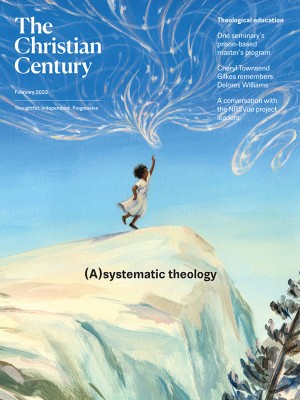February 19, Transfiguration A (Matthew 17:1-9)
When our beloved buildings are gone, what will endure is relationship.
Long, long ago—before televisions had cable, before Star Wars even existed, and before my parents moved—I had two best friends, Sheri and Jamie. After school and on weekends we did everything together. We rode our bikes over jumps in the woods. We played hide-and-seek. We reenacted Adam West’s Batman. (Sheri and I never put up with Jamie thinking he could be Batman just because he was a boy.) Our adventures had us outside until the sun went down.
We stuck together when one of us got in trouble for going door-to-door pretending to collect money for the PTA (me), when one of us was held back a grade (Jamie), and even when one of us got hit by a car (Sheri—she’s fine). We were inseparable, and our commitment went to the core. It was a bond broken only by my move away from the neighborhood when we were all still too young to stay in touch without the assistance of the adults in our lives.
Read our latest issue or browse back issues.
I think about this deep friendship when I think about Jesus heading up the mountain with only Peter, James, and John. Earlier in his ministry, Jesus is asked by a leader of the synagogue to heal his daughter, and Jesus allows only Peter, James, and John to follow him and witness the healing (Mark 5:37). Later, they are the only ones specifically invited to come with Jesus deeper into the garden of Gethsemane (Matt. 26:36–37).
Out of all of the disciples and followers, why these three? What kind of bond has formed among the four of them?
I realize that Jesus and his bosom buddies are not exactly the main point (or even in the top five) of Transfiguration Sunday as we usually approach it. If we only celebrated this literally transformational event every ten years, I wouldn’t even suggest this angle. But since the lectionary takes us up this mountain every single year, maybe there is room for a different view at the top.
Like many congregations, ours has seen a significant shift since the pandemic in who we see and who we don’t. Some have rejoined us now, and there are others who I still hope are coming back. One young man who has joined us was, by his own admission, feeling very lost. He had been a day trader and was riding the wave of the pandemic surge in the stock market, but even as he was winning, he felt like he was losing.
In a story longer than this column has room for, he left the life of a day trader, and he and his wife found their way to our congregation. Now every Monday and Friday, he and a retired member of our property and maintenance committee can be found bouncing around the church building, fixing this and that, and absolutely drinking in each other’s company. The age difference is at least 30 years, and yet both men have found meaning and deep friendship in the connection they have made.
We tend to pick on Peter in this text for his desire to build a semipermanent commemoration of the holy site. Our two guys at church are also making themselves busy repairing and updating a structure that has no guarantee of long-term survival. But even if the unspeakable happens and our beloved buildings are gone, what will endure?
Relationship—that is what will endure.
Jesus takes three of his dearest friends onto that mountain with him. And although much maligned by Matthew and in the other Gospels, in the end his friends come through—in this story, in the garden at Gethsemane, and even immediately following the resurrection (depending on your resurrection story of choice). Peter becomes the foundation of the church. James is the first of the disciples to die a martyr. John is entrusted with the care of Jesus’ own mother.
And so it is for us as well. We walk through this life together, sometimes looking out from the mountaintop and at other times groping for one another in the darkness of the valley. We don’t always get it right. We don’t always get along. Sometimes we argue about the wrong things. Sometimes we agree on the right things.
But in the end we know that it’s the relationships that make us better, our hearts fuller, and our faith stronger.





